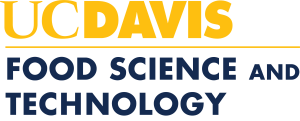COURSE GOALS: Food Science and Technology 103 is designed to acquaint students with the theory and application of physical and chemical methods for determining the constituents of foods. Modern separation and instrumental analysis techniques are stressed.
PREREQUISITES: CHE 2A, 2B and 2C; CHE 8A and 8B; BIS 102 and 103; FST 100B
COURSE FORMAT: The course is given as two 1-hour lectures, one 1-hour discussion, and 1-three hour laboratory session per week. The lectures are used to present the theory of various analytical techniques used in modern food analysis. Laboratory exercises are selected to complement lecture material and require written reports. The discussion sections are used for discussions among student on how theory relates to the instrumentation used in the laboratory exercises. Help sessions for problem set assignments are also provided during discussion sections.
GRADING: One midterm (100 points), problem sets (100 points), lab reports (200 points), lab notebook (100 points), and final exam (200 points). Final grades are based on an absolute scale.
TOPICAL OUTLINE: Lectures (number of 1-hour lectures in parenthesis):
- Sampling techniques and data analysis (1)
- Proximate analysis (3)
- General chromatography theory (2)
- Gas chromatography (3)
- Liquid chromatography (3)
- Rheology (2)
- General theory of spectroscopy (1)
- UV-visible spectroscopy (1)
- Infrared spectroscopy (1)
- Mass spectroscopy (1)
- Color measurement (1)
- Midterm exam (1).
Laboratory sessions:
- Gas chromatography (3)
- High performance liquid chromatography (3)
- Rheology (1)
- UV-visible spectroscopy (1)
- Infrared spectroscopy (1)
- Colorimetry (1).
POTENTIAL COURSE OVERLAP: This is an analytical chemistry course which focuses on methods. The theory is presented in lecture and the students gain experience in a discussion and lab. This course builds on BIS 102 and FST 100A (Food Chemistry). It also builds on the laboratory experience gained in FST 101A, which focuses on wet chemical methods. FST 103 is different from ANS 137 (2 units) in that it provides more theory of instrumentation and hands-on experience with instrumentation. FST 103 is also more chemical than biochemical focused.
